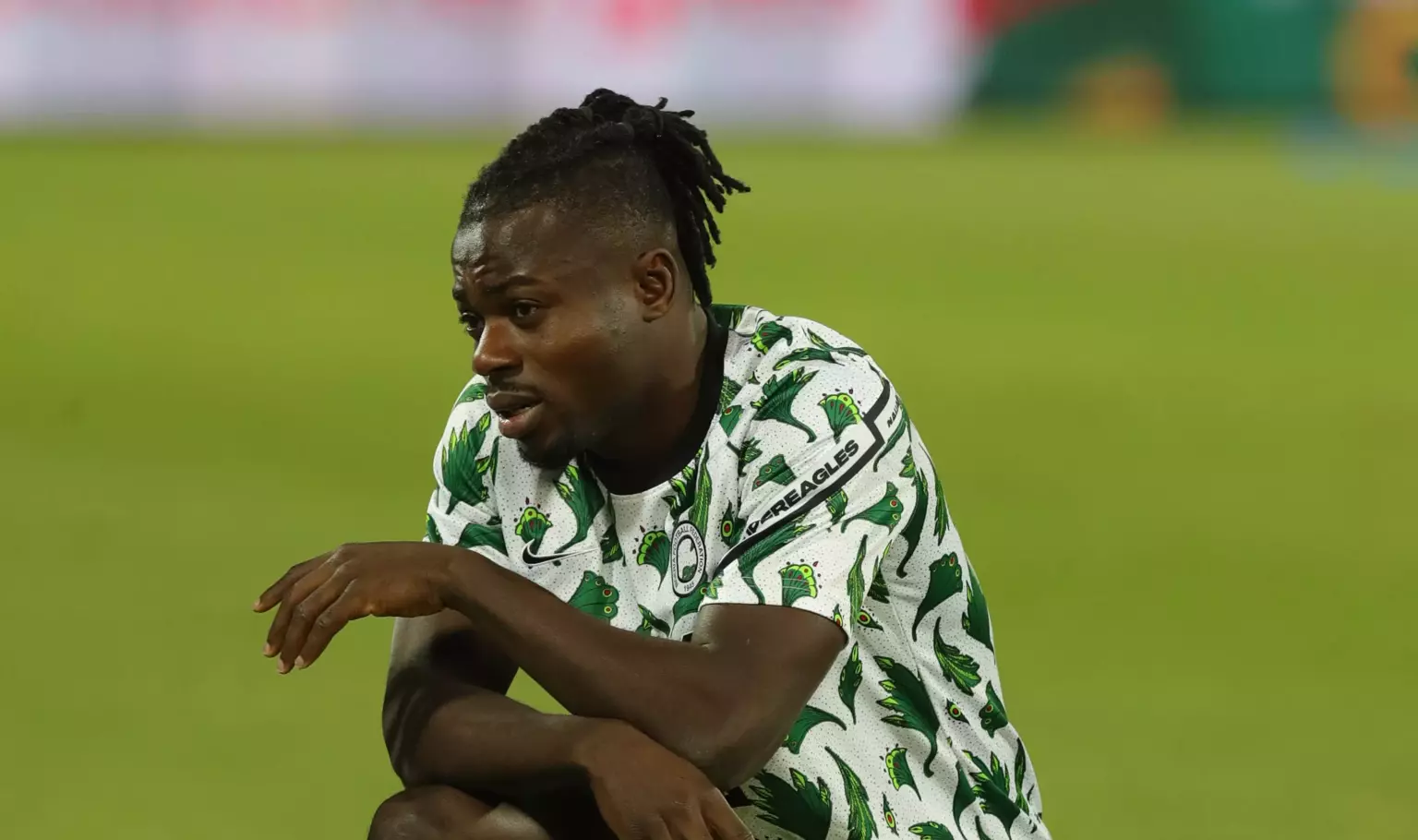Nigeria's Simon on his dreams and a road less travelled

Nantes and Nigeria winger speaks to FIFA about the highs and lows of his career, from his early years playing in Slovakia to captaining his country.
-
Nigeria have opened with two draws in CAF qualifying for the 2026 World Cup
-
Moses Simon, who captained the team against Zimbabwe, speaks to FIFA
-
Nantes player reflects on the highs and lows of his career
In the Simon family, discipline has always been a prized value.
Born in 1995 in Jos, Nigeria, to a father who was in the military, Moses Simon was raised in an army barracks and quickly got used to 5am starts. Although expected to follow in his father's footsteps in the armed forces, he opted to pursue a completely different career – albeit one that also required discipline – in football.
At the tender age of 18, this graduate of the GBS Academy in Lagos flew to the Netherlands in the summer of 2013 to take part in pre-season training with the Ajax reserves, although ultimately the Amsterdam club decided not to retain him.
The young Nigerian took the setback it in his stride and soon after signed for Slovakian outfit AS Trencin, arriving in the throes of winter. "At first I was a bit scared," Simon admitted in an exclusive interview with FIFA.
By dint of hard work and discipline, that fear quickly dissipated, paving the way for an impressive top-level career. After Trencin, the wide man gained further experience at Gent, where he won the Belgian championship, then at Spanish club Levante, before a 2019 move took him to French Ligue 1 side Nantes, with whom he won the Coupe de France in 2022.
The 28-year-old has also enjoyed some great experiences with the Super Eagles. His first international competition was at the FIFA U-20 World Cup Turkey 2013™, before he had even turned 18. "I was young, but I had the ability," Simon recalls. An unused squad member on that occasion, he would return to play an important part at the next edition two years later in New Zealand.
However, the winger is still waiting for his first experience of a senior FIFA World Cup™. After featuring in the qualifiers for Russia 2018 and making then-coach Gernot Rohr’s provisional squad for the tournament, he had to withdraw due to injury. Four years later, the Super Eagles lost out on a place in Qatar after being beaten in a play-off by Ghana on away goals. "Missing the World Cup is something I wouldn’t wish on my worst enemy," Simon said.
The Nigerian is now hoping to qualify for the FIFA World Cup 26™ despite the Super Eagles beginning their qualifying campaign with consecutive 1-1 draws with Lesotho and Zimbabwe. In conversation with FIFA, he looks back on the ups and downs of his club and international career to date.
FIFA: Your career has not followed a typical path. How did you find moving to Slovakia aged just 19?
Moses Simon: It was hard. I was in Holland before going to Slovakia, but it was during the summer. And I left to Slovakia during the winter, in January. So, it was hard with the wind especially. I didn’t expect it to be so cold. And I had never seen snow before! At first, I was a little bit scared. I was wondering: if someone kicks me, what would the pain feel like? I thought I was going to play just like I had in Holland, but it was totally different. But the important thing is that I had a Nigerian player with me [Kingsley Madu]. We had played together in Nigeria. It was good because we could communicate with each other, we helped each other. Everywhere I go, I always meet a Nigerian or a Ghanian player. We speak the same tongue. It's like meeting a brother. You can interact. They are like a family that try to help you.
What kind of routine did you have in Slovakia?
I just stayed in my room, just going out for training then came back, I never went out. Training, home, training, home. But I got used to it. I'm the kind of person that doesn't go out most of the time because this is the way I was brought up. From school, you go home. From training, you go home. They taught us that the more time you stayed outside, the more problems you brought home. So after school, we always went straight back home. After training, home. There was no difference when I arrived in Slovakia.
When you started playing in Holland and then in Slovakia, did you believe you could have the career you've had?
I didn't think so, but I had the feeling that I was going to 'make it' – that is becoming a professional player, which contributes to the life of my parents, my siblings, my friends. It gave me a new life. Once you're a professional player, no matter what it takes, you will have something to take back home. And back home, people struggle to eat. So once you make it, you can feed your family members. I wanted to make it so my people could be proud of me. And today, I know they are.
At international level, you’ve also had success and were part of Nigeria squads at two U-20 World Cups. What memories do you have from those tournaments?
My first one was in 2013 in Turkey. I was 17, I was like a ball boy and I didn’t play one single game. I was really young but I was capable. Then there was 2015 in New Zealand. It was the farthest-away country I've ever been to, I thought we were going to the end of the world! I even felt sick because it was very long. But the World Cup was fantastic for me, really fantastic. We eventually lost [1-0 in the Round of 16 against Germany], but I had a really good time.
Then, with the senior team, you missed out on 2018 through injury and Nigeria didn’t qualify for the 2022 World Cup. How did that feel?
In 2018, at first, I felt really sad. I played all the qualification games, I started and I finished [the matches]. But in the end, I didn't go to the World Cup. It’s something I would not wish on my worst enemy. I was really devastated. But not any more. Now, I just think: ‘OK, I thank God for everything because I know that it's for a reason.' It [not going to the 2018 World Cup and or qualifying for Qatar 2022] motivated me to keep working hard. I want to play in the next World Cup, it’s a dream. I just need to do my best, push and work hard. If the coach calls me, good. If he doesn't and calls up someone else, I will be happy to support them.
You wore the captain's armband in Nigeria's match against Zimbabwe on 19 November. What did that mean to you?
First of all, I have to thank the coach for that. Then, I want to thank the players for the respect they give me. To be the captain of your nation is a big honour, but it is not easy. It's not the same as being captain in your club. You carry the whole nation, so you have to be a strong leader. I'm really happy that I captained Nigeria and, even if I’m told that I won’t be the captain any more, I'm still grateful for the opportunity. Football has taken me all the way to captaining the Super Eagles! I had never, ever been the captain of even the Academy where I came from, so it meant so much.
Looking back at all those experiences you have lived through – from playing in Slovakia to captaining your country – what advice would you give to your 19-year-old self?
I would just say: you can do more. At 19, it is the time you need to prove to the world that you are one of the best players. If you can put this in your head, you will make it for sure. You will go further than where you are now. Just keep working. Also, respect the people around you. Respect your coaches. Listen to what they say, this is key. Don't argue with your leader or with anyone that is older than you and that has seen it all before you. Listen and understand, and you will go far.
CREDIT: FIFA.com













